====================
This sermon was preached on the 20th Sunday after Pentecost, October 6, 2013, at St. Paul’s Episcopal Church, Medina, Ohio, where Fr. Funston is rector.
(The Revised Common Lectionary, Proper 22C: Lamentations 1:1-6; Psalm 137; 2 Timothy 1:1-14; and Luke 17:5-10. These lessons can be read at The Lectionary Page.)
====================
You may recognize this reggae version of a portion of Psalm 137, the psalm we recited this morning, combined with a paraphrase of verse 14 of Psalm 19. It was originally done by the Melodians in 1969, but the version I played was recorded by Boney M, a German Caribbean group, in 1978 and claimed the Number 1 spot on the European pop charts that year. It’s quite a danceable little tune; it puts a bounce in your step which seems quite at odds with Psalm 137’s words of lament and with the violent imprecation with which the psalm concludes. I’ll return to this musical version in a moment, but first let’s take a closer look at this psalm and our other lessons today.
Paul begins his letter to the young bishop, Timothy, whom he has nurtured in the faith, with these words: “I am grateful to God — whom I worship with a clear conscience, as my ancestors did . . . .” I’m glad that Paul was able to do so, to worship with a clear conscience, because I think he was wrong about his ancestors! His ancestors were the ones who wrote the psalm we recited just before Paul’s letter was read, the psalm that ends with these words:
Remember the day of Jerusalem, O Lord, against the people of Edom, *
who said, “Down with it! down with it! even to the ground!”
O Daughter of Babylon, doomed to destruction, *
happy the one who pays you back for what you have done to us!
Happy shall he be who takes your little ones, *
and dashes them against the rock!
(Ps 137:7-9)
I don’t know about you, but I have a hard time worshiping with a clear conscience after reciting such words and, I suspect, so did the ancient Jews, even though those awful words may have been as heart-breakingly genuine, as horrifically honest as possible.
There is academic debate about the authorship of this letter; many scholars believe that it was not written by Paul even though it purports to be his personal farewell address, “Paul modeling how to die” as one commentator puts it. So we don’t really know when or why this letter was written, or by whom (but we’ll call the author “Paul” anyway). We know that Timothy was in tears: “Recalling your tears,” writes Paul, “I long to see you so that I may be filled with joy.” Presumably, Timothy is distraught over Paul’s imprisonment and probable impending execution. Paul’s advice to Timothy is to buck up! “God did not give us a spirit of cowardice, but rather a spirit of power and of love and of self-discipline.” Please keep this advice (and the happy, danceable music to which the Melodians and Boney M set Psalm 137) in mind as we turn to the other lessons of the day.
Lessons like the reading from Luke’s Gospel in which Jesus admonishes his followers (specifically the Apostles, but also us), “When you have done all that you were ordered to do, say, ‘We are worthless slaves; we have done only what we ought to have done!'” Bill Loader, an Australian theologian whose work and words I rather like, says this admonition is a slap in the face to the established order:
It deconstructs hierarchy [and] debunks the idea that we achieve value by achieving the good, as though we deserve a bonus for being decent, caring human beings. It does not let us play the game. We can’t claim: you ought to love me, because look at how good I am! Look at what I have done! The passage is probably deliberately offensive in flooring aspirations to human worth based on achievement capital. It is annoying and frustrating, and even seems mean. It gives us no credit. (First Thoughts)
Jesus’ comment subverts any system that bases value on achievement; very simply, Jesus is saying that we are valued by God (and thus should value one another), not because of what we achieve, but because of who we are! Paul’s admonition to Timothy to buck up because we have been given “a spirit of power and of love and of self-discipline” is grounded in the assurance of Jesus that we are loved by God not because we have accomplished anything, but simply because of who we are.
The way Jesus (who is, remember, the incarnation of God) approaches human dignity and value is hugely comforting in a world where the poor are exploited and where anger explodes in violence and terror which disregards human life, in the very world of Psalm 137 and its cry for vengeance, its imprecation that someone will ” take [Babylon’s] little ones and dash them against the rock!”
So what was the world of Psalm 137? It was the world of the Babylonian exile, the world of the destruction of Jerusalem, the world of the demolition of the Temple, the very heart and soul of the Jewish people. The year was 587 B.C.E. The armies of Nebuchadnezzar of Babylon, aided and cheered on by the Edomites (ancestral enemies of the Jews, supposedly descended from Jacob’s brother Esau) invaded the southern kingdom of Judah. (The northern kingdom of Israel had already been destroyed by the Assyrians 150 years or so before.) The Babylonians took possession of Jerusalem, raping, pillaging, and slaughtering with abandon. They seized the priests and the scribes, the king and the nobles, the wealthy leaders and their accountants, and took them away to Babylon. For those left behind, the economy quickly collapsed, food became scarce, water became foul, the daily life ceased to make sense. Order was replaced by chaos. Jerusalem became a wasteland. The Book of Lamentations describes the scene:
How lonely sits the city
that once was full of people!
. . . .
How like a widow she has become,
she that was great among the nations!
. . . .
Her foes have become the masters,
her enemies prosper;
. . . .
her children have gone away,
captives before the foe.
(Lamentations 1:1,5)
The psalmist, speaking for those who have suffered through this desolation, curses those who have caused it. The psalm’s cries of deep sorrow (“We wept; we could not sing!”) and the dreams of horrible acts of vengeance (“Happy the one who murders their infants!”) are cathartic; they are a means of working through and overcoming the intense hurt of defeat and exile. By voicing anger to God, the exiles cleanse themselves of violent emotion, but they also give themselves a reason to persist.
In his book, Man’s Search for Meaning (Beacon Press, Boston, 2006), psychologist Viktor Frankl described his own experience in the Nazi death camps of the Holocaust and the lessons he and his fellow inmates learned about spiritual survival. Among those learnings was the need for a goal: “It is a peculiarity of man that he can only live by looking to the future,” (p. 73) even if that future is one of vengeance. Without a goal, the concentration camp prisoners ceased to live for the future; indeed, they ceased to live at all, they simply decayed. “He who has a ‘why’ to live for can bear with almost any ‘how'” wrote Frankl. (p. 76) Their anger and dreams of revenge supplied the exiles with the why, the goal, the reason for them to survive. The provocative and hyperbolic language of the psalm expresses the horror and outrage the exiles were experiencing, and describes a future for which they could live. That it is a horrific future does not deprive it of its spiritually supportive power.
In their defense, we should note that “dashing babies” was a common practice of warfare in the international community of the exiles’ time. In the Second Book of Kings, for example, Elisha weeps in the presence of a foreign general who asks why the man of God is crying, and Elisha answers: “Because I know the evil that you will do to the people of Israel; you will set [Israel’s] fortresses on fire, you will kill their young men with the sword, dash in pieces their little ones, and rip up their pregnant women.” (2 Kgs.8:12) Babylonian armies are known to have killed babies, raped women, and blinded some their war prisoners. The Babylonians committed terrible atrocities against the people Judah so, in their dreams of retribution, they cried out to God for proportional retribution. There is, however, no evidence that the exiles ever followed through on their bloodthirsty dreams of revenge.
Psalm 137 “tells it like it is;” anger, vengeance, hatred, rage, pain and suffering are a human reality. The people of Judah believed that everything they had hoped for and everything they relied upon, their own country, their sacred priesthood, the Davidic kingdom, and the Jerusalem temple had been taken away by the bloodthirsty Babylonians. We know that faith becomes compromised when hopes of ease and comfort and success are snatched away by economic chaos, by terrorism, by personal health problems, by hunger, or by the dysfunction (or non-function) of government. Bad things happen and people react. Many, I am sure, have been guilty of extremes of thought like those voiced by the psalmist. Have you never wished someone dead, even in unspoken your thoughts? I confess that I have. Have you never told someone (even if only under your breath) to “Go to Hell”? I have! In today’s culture, that may be more acceptable than threatening to “dash babies,” but theologically speaking, it voices a much stronger sentiment than the psalm. We and our world are more like the exiles and theirs than we know or want to admit.
This is how this psalm, this awful, horrific psalm, speaks both to and for us. The Babylonians may not have attacked us, but we live in a world at least as violent as that of the exiles. Since 1900, there have been 232 wars; more than 96 million people have been killed in those wars, and it is an inescapable fact of modern history that the same barbarism described in Psalm 137 or the Book of Lamentations or the Second Book of Kings occurred in many of those wars and still occurs today. One need only think of the ethnic cleansing episodes in the former Yugoslavia, the civil war in Rwanda, and the almost daily atrocities currently happening in Iraq, Syria, Pakistan, Myanmar, and elsewhere.
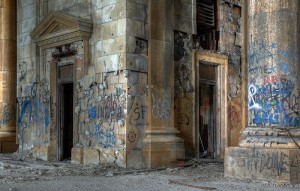 We live in a country where there are cities once full of people now sitting lonely: we sit here today less than 200 miles by turnpike from Detroit, where the picture on the cover of our bulletin was taken, a city which has been described as looking as if it had been bombed in a war! Just yesterday, Salon reported that in the United States there are 14 million unoccupied residences. Six months ago, “Detroit had more than 83,000 unoccupied residential addresses. That constitutes nearly 25 percent of the city’s potential housing stock. New Orleans had 44,000, for 21 percent. Cleveland had 41,000, or 19 percent.” (Salon, Abandoned Homes) Cities once full of people are sitting abandoned and lonely. Meanwhile, on any given night in this country over 633,000 homeless people sleep in shelters, and no one knows how many may be sleeping in cars, under bridges, squatting in abandoned buildings, or simply out on the streets. (National Alliance to End Homelessness)
We live in a country where there are cities once full of people now sitting lonely: we sit here today less than 200 miles by turnpike from Detroit, where the picture on the cover of our bulletin was taken, a city which has been described as looking as if it had been bombed in a war! Just yesterday, Salon reported that in the United States there are 14 million unoccupied residences. Six months ago, “Detroit had more than 83,000 unoccupied residential addresses. That constitutes nearly 25 percent of the city’s potential housing stock. New Orleans had 44,000, for 21 percent. Cleveland had 41,000, or 19 percent.” (Salon, Abandoned Homes) Cities once full of people are sitting abandoned and lonely. Meanwhile, on any given night in this country over 633,000 homeless people sleep in shelters, and no one knows how many may be sleeping in cars, under bridges, squatting in abandoned buildings, or simply out on the streets. (National Alliance to End Homelessness)
We live in a country where 49 million Americans live in food insecure households, including almost 16 million children; where over 29 million people rely on assistance from government programs (now sadly shut down) to obtain sufficient food; and where 6.2 million households at least once in the last year have accessed emergency food from a food pantry or soup kitchen. (Feeding America)
This is not the country of our hopes and dreams; it is not the country we want it to be; it’s not even the country we think it is! It is a strange land: “How shall we sing the Lord’s song in a strange land?” The psalm speaks to and for us.
In this psalm, the poet and the exiles turned their pain over to God! Giving voice to their sorrow, their anger, and their thirst for revenge, they were able to let go of them and to trust in God to act as God might. They were able to follow Paul’s advice to Timothy, to buck up, to rely not on the spirit sorrow and of anger and of cowardly vengeance, but rather a spirit of power and of love and of self-discipline. Eventually, they came to understand that they were valued by God (and thus should value others, even their enemies), not because of what they had or had not achieves, but simply because of who they were! This brought them a sense of freedom — even in their exile — to dream, to hope, and to pray. Their prayers may have been, as Bible scholar Walter Wink said, “impertinent, persistent, shameless, indecorous, [and] more like haggling in an outdoor bazaar than the polite monologues of the church,” and they may have offered them with far less a clear conscience than Paul claims, but through them they voiced faith and courage to hand their desire for revenge over to God; through them they started the long healing process of returning home and truly worshiping God.
And so can we. We can end the wars and put a stop to the genocides. We can rebuild the cities and house the homeless. We can provide good nutrition for everyone and end food insecurity. We can do so because, I believe, we have faith at least the size of a mustard seed, because we have been given a spirit of power and of love and of self-discipline, and because we are God’s servants and we know what we ought to do. And when we have done it, we can sing Psalm 137 like a dance tune, with a spring in our step, like exiles returning home to God!
Amen!
====================
A request to my readers: I’m trying to build the readership of this blog and I’d very much appreciate your help in doing so. If you find something here that is of value, please share it with others. If you are on Facebook, “like” the posts on your page so others can see them. If you are following me on Twitter, please “retweet” the notices of these meditations. If you have a blog of your own, please include mine in your links (a favor I will gladly reciprocate). Many thanks!
====================
Father Funston is the rector of St. Paul’s Episcopal Church, Medina, Ohio.
 Black Friday. The day after Thanksgiving Day in the United States. A day whose name comes from financial accounting and the ancient practice of recording profits in black ink, losses in red. Supposedly, at one time, this was the day when retail merchants who might have been running “in the red” the whole year would see themselves “in the black” at long last. I don’t know if that is still the case, but the name has stuck. Black Friday is the day after Thanksgiving Day.
Black Friday. The day after Thanksgiving Day in the United States. A day whose name comes from financial accounting and the ancient practice of recording profits in black ink, losses in red. Supposedly, at one time, this was the day when retail merchants who might have been running “in the red” the whole year would see themselves “in the black” at long last. I don’t know if that is still the case, but the name has stuck. Black Friday is the day after Thanksgiving Day. We live in a country where there are cities once full of people now sitting lonely: we sit here today less than 200 miles by turnpike from Detroit, where the picture on the cover of our bulletin was taken, a city which has been described as looking as if it had been bombed in a war! Just yesterday, Salon reported that in the United States there are 14 million unoccupied residences. Six months ago, “Detroit had more than 83,000 unoccupied residential addresses. That constitutes nearly 25 percent of the city’s potential housing stock. New Orleans had 44,000, for 21 percent. Cleveland had 41,000, or 19 percent.” (
We live in a country where there are cities once full of people now sitting lonely: we sit here today less than 200 miles by turnpike from Detroit, where the picture on the cover of our bulletin was taken, a city which has been described as looking as if it had been bombed in a war! Just yesterday, Salon reported that in the United States there are 14 million unoccupied residences. Six months ago, “Detroit had more than 83,000 unoccupied residential addresses. That constitutes nearly 25 percent of the city’s potential housing stock. New Orleans had 44,000, for 21 percent. Cleveland had 41,000, or 19 percent.” ( Once again I find this serendipitous connection between one verse in the Daily Office psalm and a news item in the daily papers. Psalm 105 is divided into two parts and our lectionary bids us read the first at Morning Prayer and the second at Evening Prayer. The psalm describes the Hebrews sojourn in Egypt. Part One (vv. 1-22) describes the captivity of Joseph and his later elevation to leadership in the pharaoh’s court, which occasioned the children of Israel taking refuge in “the land of Ham” where they were subsequently enslaved. Part Two (vv. 23-45) tells the story of Moses, the Exodus, and the Hebrews coming into the Promised Land.
Once again I find this serendipitous connection between one verse in the Daily Office psalm and a news item in the daily papers. Psalm 105 is divided into two parts and our lectionary bids us read the first at Morning Prayer and the second at Evening Prayer. The psalm describes the Hebrews sojourn in Egypt. Part One (vv. 1-22) describes the captivity of Joseph and his later elevation to leadership in the pharaoh’s court, which occasioned the children of Israel taking refuge in “the land of Ham” where they were subsequently enslaved. Part Two (vv. 23-45) tells the story of Moses, the Exodus, and the Hebrews coming into the Promised Land. In ten days we will begin our celebration of his birth, but the Daily Office lectionary today has us consider his last meal on the night before his death . . . .
In ten days we will begin our celebration of his birth, but the Daily Office lectionary today has us consider his last meal on the night before his death . . . .  It may be the United States’ holiday of Thanksgiving Day, but the Daily Office continues at this time of year delivering its message of repentance rather than encouraging thanksgiving. The Old Testament lesson is another from Malachi in which the Lord speaking to the priests says that he has spread dung on their faces and put them out of his presence! The gospel lesson from Luke has Jesus predicting the end of the world. And then there’s this epistle lesson which condemns the wealthy. Just not a lot of giving thanks!
It may be the United States’ holiday of Thanksgiving Day, but the Daily Office continues at this time of year delivering its message of repentance rather than encouraging thanksgiving. The Old Testament lesson is another from Malachi in which the Lord speaking to the priests says that he has spread dung on their faces and put them out of his presence! The gospel lesson from Luke has Jesus predicting the end of the world. And then there’s this epistle lesson which condemns the wealthy. Just not a lot of giving thanks! It is intriguing how often in stories of Holy Scripture food plays a role. From the “apple” in the Garden, to Abraham offering a meal of cakes and meat to the three men (who turn out to God) at the Oaks of Mamre, to this story of Gideon, to David and his men eating the Bread of the Presence, to all the food items listed as items of sacrifice in Leviticus, the Old Testament (indeed, the whole Bible) is food focused. The People of God define themselves through the annual reenactment of a ritual meal celebrating the Passover; the new People of God define themselves (in my tradition and others) by the weekly reenactment of a ritual meal celebrating the death and Resurrection of Christ and anticipating his return. It’s intriguing but not surprising. The Jewish and Christian faiths are not, in the long run, about following rules of ritual or moral conduct; they are about being in an intimate relationship with that which is the source of being, that which we call “God” and address as “Father” or brother or redeemer. And, other than sex, there is probably no more intimate activity two or more people can share than eating together.
It is intriguing how often in stories of Holy Scripture food plays a role. From the “apple” in the Garden, to Abraham offering a meal of cakes and meat to the three men (who turn out to God) at the Oaks of Mamre, to this story of Gideon, to David and his men eating the Bread of the Presence, to all the food items listed as items of sacrifice in Leviticus, the Old Testament (indeed, the whole Bible) is food focused. The People of God define themselves through the annual reenactment of a ritual meal celebrating the Passover; the new People of God define themselves (in my tradition and others) by the weekly reenactment of a ritual meal celebrating the death and Resurrection of Christ and anticipating his return. It’s intriguing but not surprising. The Jewish and Christian faiths are not, in the long run, about following rules of ritual or moral conduct; they are about being in an intimate relationship with that which is the source of being, that which we call “God” and address as “Father” or brother or redeemer. And, other than sex, there is probably no more intimate activity two or more people can share than eating together.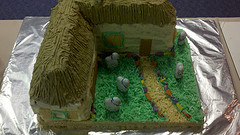 It was an extremely busy weekend. Our parish youth group held its Second Annual Homeless Awareness Sleep-Out with kids from several other parishes. Dozens of kids and adult chaperones slept in self-made cardboard shelters on the front lawn of the church to call attention to homelessness in our community. They raised more than $500 for Project Homes (our local shelter program) by “panhandling” on the town square. That was Saturday night.
It was an extremely busy weekend. Our parish youth group held its Second Annual Homeless Awareness Sleep-Out with kids from several other parishes. Dozens of kids and adult chaperones slept in self-made cardboard shelters on the front lawn of the church to call attention to homelessness in our community. They raised more than $500 for Project Homes (our local shelter program) by “panhandling” on the town square. That was Saturday night.
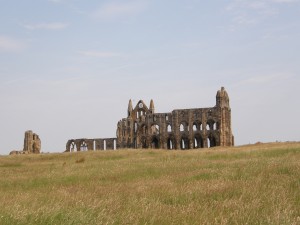
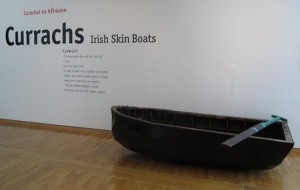
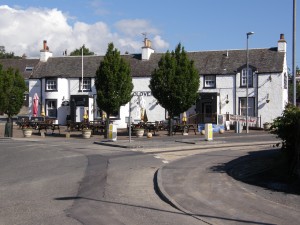 It was a very full day with lots to consider, lots to think about, and lots to relate. So let us return to Clovensford Country Hotel for the moment and consider the “full Scottish breakfast.” The full Irish, it ain’t! At least as served at Clovensford. Don’t get me wrong; it was a lovely breakfast, but it wasn’t what I was expecting.
It was a very full day with lots to consider, lots to think about, and lots to relate. So let us return to Clovensford Country Hotel for the moment and consider the “full Scottish breakfast.” The full Irish, it ain’t! At least as served at Clovensford. Don’t get me wrong; it was a lovely breakfast, but it wasn’t what I was expecting. 

